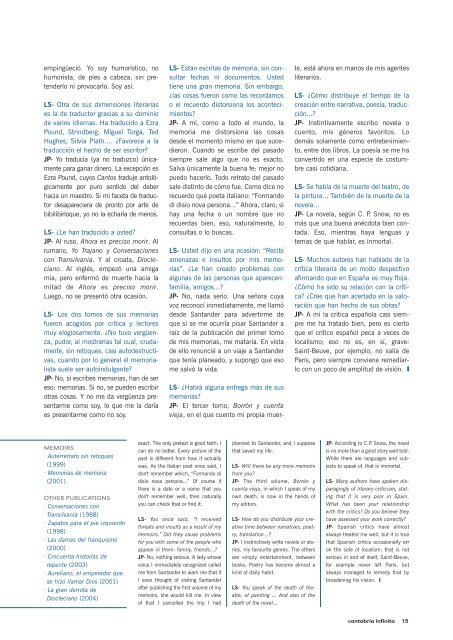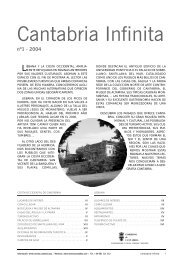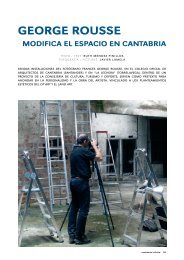Jesús Pardo Jesús Pardo - Cultura de Cantabria
Jesús Pardo Jesús Pardo - Cultura de Cantabria
Jesús Pardo Jesús Pardo - Cultura de Cantabria
You also want an ePaper? Increase the reach of your titles
YUMPU automatically turns print PDFs into web optimized ePapers that Google loves.
empingüeció. Yo soy humorístico, no<br />
humorista, <strong>de</strong> pies a cabeza, sin preten<strong>de</strong>rlo<br />
ni provocarlo. Soy así.<br />
LS- Otra <strong>de</strong> sus dimensiones literarias<br />
es la <strong>de</strong> traductor gracias a su dominio<br />
<strong>de</strong> varios idiomas. Ha traducido a Ezra<br />
Pound, Strindberg, Miguel Torga, Ted<br />
Hughes, Silvia Plath.... ¿Favorece a la<br />
traducción el hecho <strong>de</strong> ser escritor?<br />
JP- Yo traducía (ya no traduzco) únicamente<br />
para ganar dinero. La excepción es<br />
Ezra Pound, cuyos Cantos traduje antológicamente<br />
por puro sentido <strong>de</strong>l <strong>de</strong>ber<br />
hacia un maestro. Si mi faceta <strong>de</strong> traductor<br />
<strong>de</strong>sapareciera <strong>de</strong> pronto por arte <strong>de</strong><br />
bibilibirloque, yo no la echaría <strong>de</strong> menos.<br />
LS- ¿Le han traducido a usted?<br />
JP- Al ruso, Ahora es preciso morir. Al<br />
rumano, Yo Trajano y Conversaciones<br />
con Transilvania. Y al croata, Diocleciano.<br />
Al inglés, empezó una amiga<br />
mía, pero enfermó <strong>de</strong> muerte hacia la<br />
mitad <strong>de</strong> Ahora es preciso morir.<br />
Luego, no se presentó otra ocasión.<br />
LS- Los dos tomos <strong>de</strong> sus memorias<br />
fueron acogidos por crítica y lectores<br />
muy elogiosamente. ¿No tuvo vergüenza,<br />
pudor, al mostrarlas tal cual, crudamente,<br />
sin retoques, casi auto<strong>de</strong>structivas,<br />
cuando por lo general el memorialista<br />
suele ser autoindulgente?<br />
JP- No, si escribes memorias, han <strong>de</strong> ser<br />
eso: memorias. Si no, se pue<strong>de</strong>n escribir<br />
otras cosas. Y no me da vergüenza presentarme<br />
como soy, lo que me la daría<br />
es presentarme como no soy.<br />
MEMOIRS<br />
· Auterretrato sin retoques<br />
(1999)<br />
· Memorias <strong>de</strong> memoria<br />
(2001)<br />
OTHER PUBLICATIONS<br />
· Conversaciones con<br />
Transilvania (1988)<br />
· Zapatos para el pie izquierdo<br />
(1998)<br />
· Las damas <strong>de</strong>l franquismo<br />
(2000)<br />
· Cincuenta historias <strong>de</strong><br />
repente (2003)<br />
· Aureliano, el emperador que<br />
se hizo llamar Dios (2001)<br />
· La gran <strong>de</strong>rrota <strong>de</strong><br />
Diocleciano (2004)<br />
LS- Están escritas <strong>de</strong> memoria, sin consultar<br />
fechas ni documentos. Usted<br />
tiene una gran memoria. Sin embargo,<br />
¿las cosas fueron como las recordamos<br />
o el recuerdo distorsiona los acontecimientos?<br />
JP- A mí, como a todo el mundo, la<br />
memoria me distorsiona las cosas<br />
<strong>de</strong>s<strong>de</strong> el momento mismo en que sucedieron.<br />
Cuando se escribe <strong>de</strong>l pasado<br />
siempre sale algo que no es exacto.<br />
Salva únicamente la buena fe: mejor no<br />
puedo hacerlo. Todo retrato <strong>de</strong>l pasado<br />
sale distinto <strong>de</strong> cómo fue. Como dice no<br />
recuerdo qué poeta italiano: “Formando<br />
di disio nova persona...” Ahora, claro, si<br />
hay una fecha o un nombre que no<br />
recuerdas bien, eso, naturalmente, lo<br />
consultas o lo buscas.<br />
LS- Usted dijo en una ocasión: “Recibí<br />
amenazas e insultos por mis memorias”.<br />
¿Le han creado problemas con<br />
algunas <strong>de</strong> las personas que aparecen:<br />
familia, amigos...?<br />
JP- No, nada serio. Una señora cuya<br />
voz reconocí inmediatamente, me llamó<br />
<strong>de</strong>s<strong>de</strong> Santan<strong>de</strong>r para advertirme <strong>de</strong><br />
que si se me ocurría pisar Santan<strong>de</strong>r a<br />
raíz <strong>de</strong> la publicación <strong>de</strong>l primer tomo<br />
<strong>de</strong> mis memorias, me mataría. En vista<br />
<strong>de</strong> ello renuncié a un viaje a Santan<strong>de</strong>r<br />
que tenía planeado, y supongo que eso<br />
me salvó la vida.<br />
LS- ¿Habrá alguna entrega más <strong>de</strong> sus<br />
memorias?<br />
JP- El tercer tomo, Borrón y cuenta<br />
vieja, en el que cuento mi propia muer-<br />
exact. The only pretext is good faith: I<br />
can do no better. Every picture of the<br />
past is different from how it actually<br />
was. As the Italian poet once said, I<br />
don't remember which, “Formando di<br />
disio nova persona...” Of course if<br />
there is a date or a name that you<br />
don't remember well, then naturally<br />
you can check that or find it.<br />
LS- You once said, “I received<br />
threats and insults as a result of my<br />
memoirs.” Did they cause problems<br />
for you with some of the people who<br />
appear in them: family, friends...?<br />
JP- No, nothing serious. A lady whose<br />
voice I immediately recognized called<br />
me from Santan<strong>de</strong>r to warn me that if<br />
I even thought of visiting Santan<strong>de</strong>r<br />
after publishing the first volume of my<br />
memoirs, she would kill me. In view<br />
of that I cancelled the trip I had<br />
planned to Santan<strong>de</strong>r, and I suppose<br />
that saved my life.<br />
LS- Will there be any more memoirs<br />
from you?<br />
JP- The third volume, Borrón y<br />
cuenta vieja, in which I speak of my<br />
own <strong>de</strong>ath, is now in the hands of<br />
my editors.<br />
LS- How do you distribute your creative<br />
time between narratives, poetry,<br />
translation...?<br />
JP- I instinctively write novels or stories,<br />
my favourite genres. The others<br />
are simply entertainment, between<br />
books. Poetry has become almost a<br />
kind of daily habit.<br />
LS- You speak of the <strong>de</strong>ath of theatre,<br />
of painting ... And also of the<br />
<strong>de</strong>ath of the novel...<br />
te, está ahora en manos <strong>de</strong> mis agentes<br />
literarios.<br />
LS- ¿Cómo distribuye el tiempo <strong>de</strong> la<br />
creación entre narrativa, poesía, traducción...?<br />
JP- Instintivamente escribo novela o<br />
cuento, mis géneros favoritos. Lo<br />
<strong>de</strong>más solamente como entretenimiento,<br />
entre dos libros. La poesía se me ha<br />
convertido en una especie <strong>de</strong> costumbre<br />
casi cotidiana.<br />
LS- Se habla <strong>de</strong> la muerte <strong>de</strong>l teatro, <strong>de</strong><br />
la pintura... También <strong>de</strong> la muerte <strong>de</strong> la<br />
novela...<br />
JP- La novela, según C. P. Snow, no es<br />
más que una buena anécdota bien contada.<br />
Eso, mientras haya lenguas y<br />
temas <strong>de</strong> qué hablar, es inmortal.<br />
LS- Muchos autores han hablado <strong>de</strong> la<br />
crítica literaria <strong>de</strong> un modo <strong>de</strong>spectivo<br />
afirmando que en España es muy floja.<br />
¿Cómo ha sido su relación con la crítica?<br />
¿Cree que han acertado en la valoración<br />
que han hecho <strong>de</strong> sus obras?<br />
JP- A mí la crítica española casi siempre<br />
me ha tratado bien, pero es cierto<br />
que el crítico español peca a veces <strong>de</strong><br />
localismo; eso no es, en sí, grave:<br />
Saint-Beuve, por ejemplo, no salía <strong>de</strong><br />
París, pero siempre conviene remediarlo<br />
con un poco <strong>de</strong> amplitud <strong>de</strong> visión. ❙<br />
JP- According to C.P. Snow, the novel<br />
is no more than a good story well told.<br />
While there are languages and subjects<br />
to speak of, that is immortal.<br />
LS- Many authors have spoken disparagingly<br />
of literary criticism, stating<br />
that it is very poor in Spain.<br />
What has been your relationship<br />
with the critics? Do you believe they<br />
have assessed your work correctly?<br />
JP- Spanish critics have almost<br />
always treated me well, but it is true<br />
that Spanish critics occasionally err<br />
on the si<strong>de</strong> of localism; that is not<br />
serious in and of itself, Saint-Beuve,<br />
for example never left Paris, but<br />
always managed to remedy that by<br />
broa<strong>de</strong>ning his vision. ❙<br />
cantabria infinita 15




